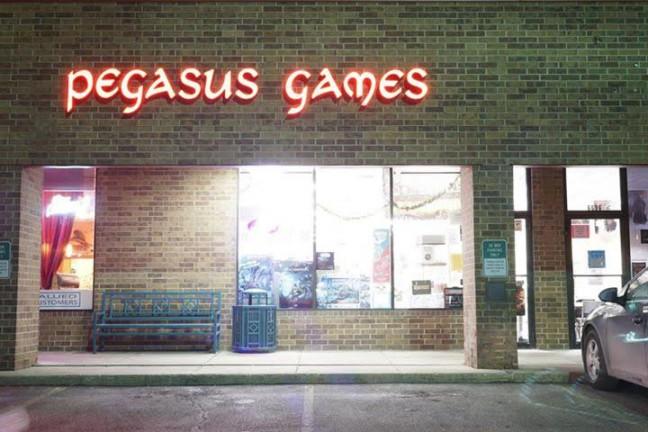Most wouldn’t typically consider verbal storytelling around a card table a game. Unless, perhaps, the storyteller asked those gathered to envision themselves fighting goblins, rescuing children or casting spells.
These scenarios are something regularly encountered by participants of “Dungeons and Dragons,” a live action role playing game that holds sessions at the Pegasus Games store in Madison each week.
Pegasus Games, which first opened its doors in Madison in 1981, boasts a sizeable selection of non-electronic gaming materials ranging from action figurines, to “Dungeons and Dragons” game books to 20 sided dice in more than 10 colors.
But the real draw of Pegasus Games isn’t necessarily the store itself, but the indoor commercial space adjacent to it. This is where people from around the area gather at scheduled times throughout the week to participate in a variety of live action role playing games. They battle goblins, cast spells and avenge oaths — all from the comfort of a card table.
“The sense of community is the biggest benefit, just having someone to talk to about what you love and not feeling like the dork in the room,” Lory Aitken, Pegasus’ Games general manager and co-founder said. “The geek-out factor here is high.”
Aitken has been an adamant player of “Dungeons and Dragons” (or what she affectionately calls “D and D”) since she was in college. It was the only role playing game around at the time. Aitken began her D and D journey when the landscape of gaming was just beginning to evolve from board games to games that combined fantasy and player’s imagination.
Deets of “D and D”
Players begin by creating a character persona, choosing between an elf, dwarf, hobbit or human. Then they roll dice to determine their “character statistics” for dexterity, clumsiness, strength and bravery — traits that will either help or hinder the character, depending on the adventures they encounter through the course of the game.

At the beginning of the game, a “Dungeon Master” is chosen. This player enjoys the most creative freedom throughout, as he or she acts as a narrator for the other players and their adventures. They also determine whether a player will “fail” or “succeed” in each round. How the “Dungeon Master” chooses what happens to each character depends on how they interpret the “Dungeons and Dragons” rulebook.
In an example round, the current “Dungeon Master” said the players had encountered green slime in the middle of the road. The players took their “turns” by narrating how their character would respond to the slime. One player, citing his character dexterity level, said he would poke at the slime. The “Dungeon Master” referred to his guidebook, and after reading through the “typical qualities of slime” section, said the slime does not respond to poking. The player thus “failed” at his turn.
Usually, “Dungeon Masters” use the rulebooks just as guidelines to prevent the entire game being predetermined. But guidelines also act as a rough outline of what would typically happen in the fantasy world of “Dungeons and Dragons.”
The combination of creativity and strategy is what makes the game so compelling to participants, and the sense of community established through characters and face-to-face interactions makes for a welcome escape from reality.
“This is people from all walks of life finding something that’s really interesting to them,” frequent player Eric Radej said. “Some people have football on weekends, and some people sit down with weird looking dice, and pretend they’re fighting monsters.”








